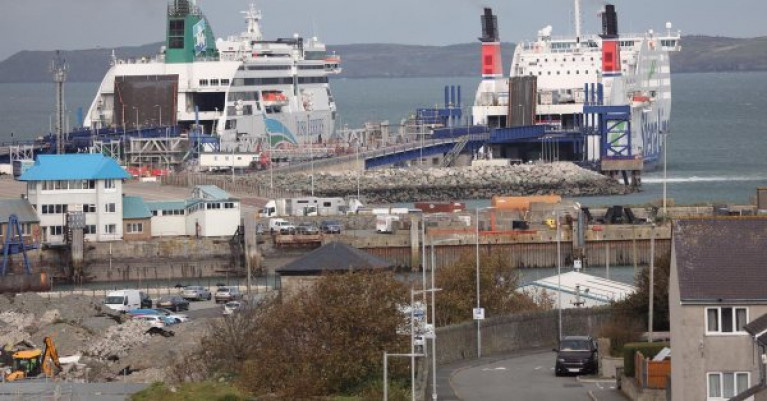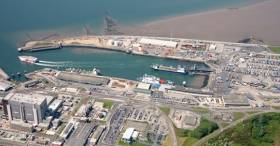Displaying items by tag: UK Gov
Holyhead Port Desperately Needs UK Gov. Cash During Covid-19 & What Could Happen If Not Backed
Additional financial support is needed to keep the Port of Holyhead’s ferry operators going during the Coronavirus pandemic, it has been claimed.
While some freight services continue between Wales and Ireland, the slashing of passenger services has led to calls for UK Government cash to bridge the gap between a drop in income and running costs of maintaining such an important strategic international transport and freight route between Dublin and Holyhead.
As a result, the leader of Anglesey Council has written to transport secretary Grant Shapps and Secretary of State for Wales Simon Hart to highlight her concerns on how it could affect the 400 workers based at the port.
Cllr Llinos Medi described the impact of coronavirus on the day-to-day operations of both Holyhead Port’s ferry operators – Stena Line and Irish Ferries – as “severe” with both having already curtailed services but remaining committed to maintaining transport of critical freight.
For much more click NorthWalesLive here
£87m Paid by UK Government for No-Deal Brexit Ferry Contracts
BBC News reports that the UK government has awarded £86.6m of contracts to ferry companies to transport medicines in the event of a no-deal Brexit.
Brittany Ferries, DFDS (see: related Brexit info), P&O and Stena Line will be able to deliver those supplies from 31 October, it said.
The contracts are aimed at making sure deliveries of vital products continue, if the UK leaves the EU without a deal.
The government was criticised earlier this year after awarding a transport contract to a company (Seaborne Freight) with no ferries.
The contracts will be in place for six months so the government is prepared for different Brexit scenarios, a spokesperson said.
For more including concerns over sourcing of medical supplies click here.
UK Ports Group Confirms Details of Government Brexit Funding
The Irish Sea ports of Liverpool and Heysham in addition Sheerness (London Medway) all part of the Peel Ports Group, have received funding to enhance measures they have already taken to improve resilience ahead of the UK’s expected departure from the EU on 31 October.
The funding according to Peel Ports Group was announced last month by Transport Secretary Grant Shapps.
These funds will go towards creating more space for HGV parking and container storage to support smooth trade operations by RORO (roll-on, roll-off) ferries, especially across the Irish Sea. (Afloat adds, Peel Ports also operate the MTL Terminal in Dublin Port.)
The fund comes as part of a £30m government scheme, announced last month, to bolster ports across England and ensure they continue to operate efficiently post-Brexit.
Mark Whitworth, Chief Executive Officer of Peel Ports, said: “We are doing everything we can to help our customers continue delivering import and export trade throughout our port network. This government funding helps us to put in place additional measures to achieve that. Whatever happens after 31 October we are as ready as we can be to facilitate global commerce that will benefit the UK economy.”
Transport Secretary Grant Shapps said: “Our world-leading maritime ports are fundamental not only to our success as a global trading nation but also to people’s everyday lives, bringing vital goods into the country. This timely investment will support ports across the country in their work to boost capacity and efficiency, ensuring they’re ready for Brexit and a successful future.”
For information on Peel Ports RoRo services click this link.
The British Ports Association has responded to the UK Government’s “two borders for four years” Brexit proposals which was announced by the Conservative Party this week.
Richard Ballantyne, Chief Executive of BPA said “The majority of Northern Ireland’s trade is with Great Britain and a border in the Irish Sea would be extremely challenging for the ports in Northern Ireland and those in England and Scotland who have freight routes. Ironically also in a ‘no deal’ situation there could be displacement issues for Welsh ports.
We recognise the sensitivities and issues around the land border and have always said that the best resolution and the best way to meet the Government’s commitment to frictionless trade is a deal that has no customs or regulatory checks at all, anywhere.”
Afloat.ie adds that Belfast Harbour is to host the BPA's annual Conference between 15-18 October.
British Government Cancels Brexit Ferry Deals
#ferries - In the UK the Department for Transport is cancelling contracts to provide extra ferry services after Brexit.
As BBC News reports, ending the contracts with Brittany Ferries and DFDS could cost the taxpayer more than £50m. (See related Eurotunnel payout story).
The government bought £89m worth of capacity from the two firms. Some of that capacity might be sold, but millions of pounds could be lost.
The contracts were designed to ease pressure on the port of Dover, by creating extra services at other ports.
In February, the DfT was forced to axe its £13.8m contract with a third company, Seaborne Freight, which the BBC found had never sailed a vessel.
Earlier this year, the National Audit Office estimated that the cancellation costs of all the ferry contracts would be £56.6m.
The cost is likely to only be several million pounds less than this. More on the story, here.
#ferries - RTE News reports that the UK's Department of Transport has cancelled a contract with a company to provide extra ferries in the event that the UK leaves the EU without a deal.
Seaborne Freight was awarded a £13.8m contract in December even though it had never run a ferry service, nor had any ships.
The British Government has cancelled the order after one of Seaborne's backers, the Irish (dry-cargo shipping) company, Arklow Shipping, withdrew from the deal.
The UK's Department of Transport said it was clear that Seaborne would not be able to meet its contractual requirements.
For more on the story click here in addition to related coverage on the Port of Ramsgate in Kent, from where the proposed route would serve Ostend in Belgium.
Brittany Ferries Moves to Reassure English Channel Passengers In Event of No-Deal Brexit
#ferries - Brittany Ferries last week released a statement (below) to reassure passengers concerned by changes following the UK Government's £108m spending initiative to use ferries to ease potential problems in the event of a no-deal Brexit.
The French operator highlighted to schedules on three of its English Channel routes. All affected passengers will be rebooked onto alternative services. In the vast majority of cases, this involves a change to departure time on the same day of travel.
It does not mean that the booking has been cancelled and that no alternative sailing will be provided by Brittany Ferries.
Furthermore, the company would like to make clear that passengers can book crossings to France and Spain, and sail-and-stay holidays as normal. There is absolutely no truth in speculation that passengers are being advised not to book because all space has been allocated to freight.
The reality is that Brittany Ferries has added 19 crossings on three of its nine routes leaving the UK. The additional sailings create more space for freight, as requested by the Department for Trnsport (DfT). As a consequence, there is now more choice for passengers rather than less, albeit departure and arrival times may have changed.
This does not mean that holidays have to be cancelled, that future bookings cannot be made or that there is any material change to Brittany Ferries business model: we are and will remain a predominantly passenger service and look forward to welcoming everyone on board.
For further information as to which routes and ferries are affected click here.

































































